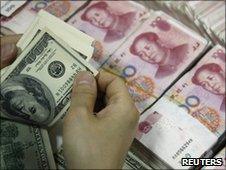Obama welcomes China's move towards flexible yuan
- Published

Many in the US say China is keeping the yuan low to boost exports
US President Barack Obama has welcomed China's announcement that it will allow the exchange rate of its currency, the yuan, to become more flexible.
Mr Obama called it a "constructive step", saying it would help boost the global recovery.
US politicians have long argued that the yuan is undervalued, giving China an unfair trade advantage.
The issue is expected to be raised at a summit of the G20 group of industrial and developing countries next week.
On Saturday, the Chinese central bank announced it would make its exchange rate mechanism "more flexible".
The bank said the proposed reform had been made possible by the global recovery.
However, it gave no details about timing and ruled out any single large-scale revaluation of the yuan, saying there was "no basis for big fluctuations or changes".
The Chinese currency has been held at about 6.83 to the dollar since July 2008, drawing criticism that China was maintaining the currency at an artificially low level to help its exporters.
Commenting on China's announcement, President Obama said it was "a constructive step that can help safeguard the recovery and contribute to a more balanced global economy".
"I look forward to discussing these and other issues at the G20 summit in Toronto next weekend."
US Treasury Secretary Timothy Geithner cautiously welcomed the move. "This is an important step but the test is how far and how fast they let the currency appreciate," he said.
Under pressure
In April, Mr Geithner delayed a report that could label China a currency manipulator, in what was seen as an attempt to give Beijing time to reform its currency without appearing to do so under pressure.
A number of members of the US Congress believe the low yuan is directly affecting their local economies.
Responding to the announcement, Democratic Senator Charles Schumer said China's statement was too vague.
"Until there is more specific information about how quickly it will let its currency appreciate and by how much, we can have no good feeling that the Chinese will start playing by the rules," he said.
The BBC's Damian Grammaticas in Beijing says the announcement may be seen as an attempt to preempt criticism of China's currency policies at the G20 summit in Canada, where Mr Obama will meet China's President Hu Jintao.
China has kept the currency from rising by selling yuan for dollars and has built up massive foreign exchange reserves as a result.
The way China invested those reserves is seen by many economists as a key factor in the recent international financial crisis.
The head of the International Monetary Fund (IMF) Dominique Strauss-Kahn said China's announcement was "a very welcome development".